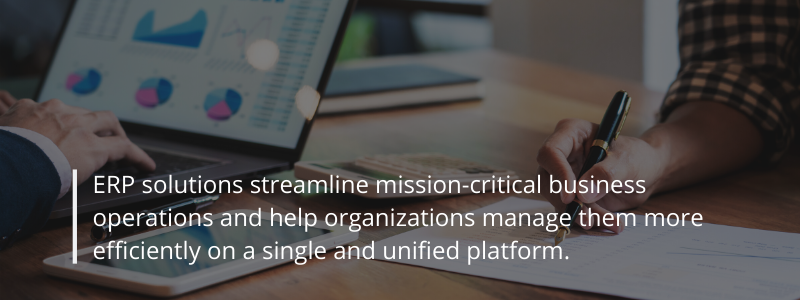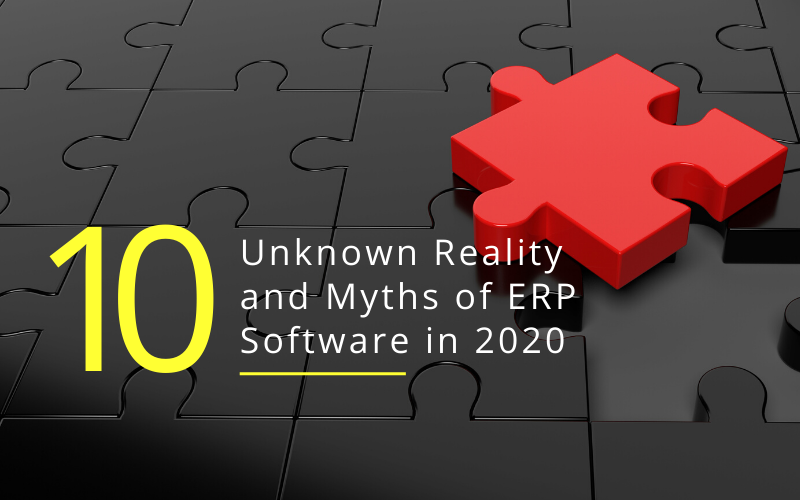10 Common Myths and Facts About ERP Software Systems
Here we have listed the common myths related to ERP systems and the actual reality about them.
1. ERP solutions are only meant for multi-national organizations, SMEs/start-up businesses don’t need them
Unfortunately, a whopping number of businesses still believe that ERP systems are too complex to manage and they can run their organizations with spreadsheets or basic systems. Whilst this is quite possible for small and medium-sized businesses, but they should also note that traditional methods are extremely time-consuming, prone to human errors and can even increase the overhead costs.
In reality, ERP solutions for SMEs/start-up businesses are specially designed to meet the preferences and needs of these organizations.
2. ERP implementation is time-consuming and takes years to complete
This was true, but during the yesteryears when ERP systems were technically unsound and needed to be built from scratch. The scenario is entirely different now. The implementation process is much faster and is executed by trained professionals.
The agile methodologies used allow ERP vendors to deploy parts of the application the moment they are ready. This makes the implementation process take less amount of time and the entire system is deployed in not more than a couple of months.
3. ERP is a one-size-fits-all system and all businesses can use the same software
This is a myth and ERP software is not a one-size-fits-all system. Each ERP solution is built for a particular industry and includes specific features to support unique business needs and obligations. Companies have more options to choose their enterprise resource planning systems that align with their business goals.

4. ERP system is meant for top management personnel only
ERP systems bring together all departments functioning within an organization. They automate critical business operations and make them accessible to the users, saving a significant amount of time and minimizing troubles for them. Thus, ERP solutions are not beneficial for the top management alone, but useful for all employees at every level and department within the organization.
5. Businesses start getting results the moment ERP is implemented
This is a widely prevailing misconception about ERP systems. Although users need not wait for years to get results, it is not going to show up immediately, from day one after the system being is implemented.
Like any other significant changes that occur within the organization, the employees need intensive training to handle ERP systems. They need time to overcome the learning curve, get used to the new technology and the way of performing their day-to-day activities.
The initial process might look relatively slow, but businesses get to see the desired ROI soon enough.
6. ERP software is useful only for streamlining internal operations
The advantages of ERP are not limited to streamlining internal operations. These systems help companies serve customers better by improving efficiency and control of the business processes. Customer satisfaction is the key to business success. Providing quality services builds long-lasting relationships with them and enables businesses to gain more loyal customers. Thus, benefits offered by ERP solutions manifold business growth.
7. Customizable ERPs are not needed
Business practices and processes are not common across the industries. Often, an off-the-shelf ERP solution comprises of many complex features that are barely needed and businesses had to pay additional costs for them. Customization removes unnecessary tools, helping organizations adopt ERP applications that suites their requirements.
8. ERP is too hard to learn
ERP software is just as difficult to learn as any other new software system that is organization-wide implemented.
However, the complexity and scope of the system require adequate time and attention from the ERP vendors toward the learning process of the employees and training them to use the application for managing day-to-day operations.
9. Maintenance and upgrading ERP system at a regular interval is not required
Like any other software, an ERP lifecycle consists of several phases, out of which maintenance and upgrading are inevitable to keep the system running and in good health.
ERP systems need to be updated in accordance with the advancement in technology and changing situations in the organization. Also, when these systems become stagnant, necessary upgrade needs to be done to improve their performance.
10. Vendor support is an afterthought
Implementing ERP solutions without considering vendor support can cost huge, especially for deploying cloud-based systems.
Though the benefits of cloud ERP software are immense, but to leverage them, businesses essentially need ERP providers who are ready to offer support at every step. Companies that do not choose their ERP vendors wisely are often plagued with hardships due to bad management and support.
Conclusion
To conclude, we can say that, do not rely on misconceptions hovering around ERP systems. Talk to the ERP software experts to get the right information about enterprise resource planning systems and the benefits these business management applications are cable of rendering after a successful implementing.
Fill in the form to get started.









